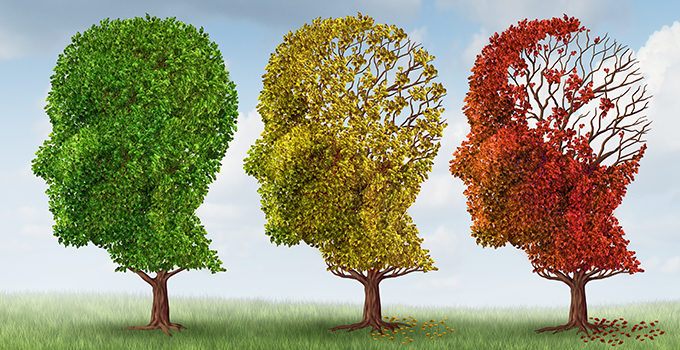

Dementia Deaths Have More Than Doubled—But How Exactly Can It Kill You?
by Guest Author
Doctors explain the deadly complications that can arise from this cluster of conditions.
- Dementia deaths have more than doubled in the U.S. in less than two decades, a new government report shows.
- People are living longer, but doctors are also becoming more aware of the disease, which could explain the uptick.
- Doctors explain how dementia can cause life-threatening complications and what you can do to protect yourself from the disease.
It’s no secret that dementia is a terrible disease, but a new government report shows that it’s also an increasingly deadly one.
The report, which was released by the National Center for Health Statistics, found that the rate of Americans who have died from dementia more than doubled in less than two decades. The data specifically show that dementia caused 30.5 deaths per 100,000 people in 2000, and it shot up to 66.7 deaths per 100,000 people in 2017. Alzheimer’s disease, the most common form of dementia, made up 46 percent of dementia deaths in 2017.
Dementia is a term used to describe a group of conditions that affect thinking, memory, and behavior enough to interfere with a person’s daily life, according to the Centers for Disease Control and Prevention (CDC). Those conditions include Alzheimer’s disease, Lewy body dementia, frontotemporal disorders, and vascular dementia, according to the National Institute on Aging (NIA).
Why are more people dying of dementia?

It’s likely due to a combination of factors, says David A. Merrill, MD, PhD, a neurologist and geriatric psychiatrist at Pacific Neuroscience Institute, Providence Saint John’s Health Center in Santa Monica, Calif.
“There’s a ‘silver tsunami,’” he says. “People are living longer and into old age, and we know that age is the single largest non-modifiable risk factor for dementia.”
Plus, there is also more of an awareness of the disease among the medical community and people as a whole, Dr. Merrill says, even though the way that dementia is diagnosed hasn’t changed. “It may be that dementia is being looked for more now than in the past,” he says, leading to an uptick in numbers.
How does dementia actually kill you?
When dementia becomes advanced, a person’s brain tissue shrinks and they cannot care for themselves or even communicate, the NIA says. Over time, this can lead to a slew of deadly complications from the disease, Dr. Merrill says.
Infections
Many people with dementia have eating problems, like difficulty swallowing. When a person can’t swallow properly, food or drink can end up in their lungs, where it can cause pneumonia, Dr. Merrill explains. When bacterial pneumonia goes untreated, it can spread to other parts of the body and potentially lead to sepsis, a severe immune system reaction that can be deadly. On top of that, a patient may also become dehydrated or malnourished due to the inability to swallow.
Illnesses that aren’t detected right away
Other serious illnesses, such as the flu, can also lead to death in dementia patients if they become severe enough. “People with advanced dementia aren’t able to express through language the fact that they’re feeling ill so there may be later detection of an illness,” Dr. Merrill says. “When an illness is finally detected, it may be more progressed and take over the body to the extent that it wouldn’t have if someone didn’t have dementia.”
Fatal falls
Falls can also be a cause of death related to dementia. “People with dementia tend to lose insight about their limitations and may still take risks that they wouldn’t in the past, like forgetting that they can’t walk without assistance,” Dr. Merrill says. “And falls come with a risk of serious injury and death.” In fact, falls are the leading cause of unintentional injury deaths in people aged 65 or older, according to the CDC.
What are the early signs of dementia?
For the record, it’s normal to be forgetful here and there—especially as you get older. As the brain ages, it shrinks and slows. The vast majority of people will have some change in their memory with age. Normal memory issues can include forgetting the names of acquaintances (but not usually loved ones), and forgetting why you went to the fridge.

But when memory slips are disruptive or frequent, it could be an early sign of dementia, says Verna R. Porter, MD, a neurologist at Pacific Neuroscience Institute in Santa Monica, Calif. That may mean it causes issues with work, hobbies, social activities, family relationships, and paying bills, she says.
Porter recommends seeing a doctor if you or a family member is doing any of the following:
- Repetitively asking the same question
- Forgetting a word/phrase or idea when speaking
- Inserting the wrong word in conversation, such as saying “chair” instead of “sofa”
- Taking longer to complete daily chores, tasks, or affairs (e.g. paying bills or managing the mail)
- Frequently misplacing objects/items around the house
- Getting lost while walking or driving in a relatively familiar areas
- Having sudden or unexplained changes in mood, personality or behavior without a clear reason
Can you prevent dementia?
There’s still a lot that experts don’t know about dementia and the causes of it, but Dr. Porter says it’s generally thought that you can lower your risk of developing the disease by exercising regularly, staying socially engaged, eating a healthy diet like the MIND diet (which focuses on eating leafy green vegetables, whole grains, and fish, among other things), keeping your brain stimulated, getting regular sleep, and managing your stress.
Bottom line: It’s crucial to see a doctor if you or a loved one starts to show signs of dementia. “It’s never too early and never to late to be detected and get treatment,” Dr. Merrill says.
For more information, contact the Pacific Brain Health Center at 310-582-7641 or schedule a consultation on the website.
Adapted from original article by Korin Miller in March 14, 2019 issue of Prevention
Last updated: May 5th, 2022